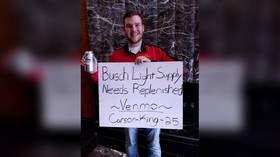Carson King scandal: Why ‘cancel culture’ is a plague on our society

Thanks to the efforts of professional complainers, we’re all one off-color tweet away from being doxxed and exiled. The disease of ‘cancel culture’ has reared its ugly head again, this time smearing both accused and accuser.
There’s a proverb that does the rounds in some of the dodgier bars in the British Isles, and it goes something like: “A man who builds a thousand bridges will be remembered as a bridge builder. But shag one sheep and he’ll forever be known as a sheep shagger.”
Case in point: Iowa sports fan Carson King. King went viral earlier this month when he held up a sign on ESPN’s ‘College Game Day,’ asking for Venmo donations to pay for his “Busch Light Supply.” When hundreds of thousands of donations actually began to come in, King offered the money to a local children’s hospital. Venmo and Anheuser-Busch matched his donation, netting the hospital a cool $1 million.
Des Moines Register reporter Aaron Calvin set out to profile King, and combed through the 24-year-old’s Twitter history, uncovering racist tweets King had sent seven years ago, when he was 16. “Should we chalk the posts up to a youthful mistake and omit the information?” Editor Carol Hunter wondered.
A statement from our editor: pic.twitter.com/ZH9AhcrYbg
— Des Moines Register (@DMRegister) September 25, 2019
They didn’t. The paper decided to devote “a few paragraphs” to King’s teenage tweets, but before publication, King got ahead of the story, apologizing profusely to local media at a press conference. Annheuser-Busch announced shortly afterwards that it would honor its donation pledge, but cut its ties with King going forward.
So, was bigotry defeated forever thanks to one brave reporter? No. Critics raged at the Register for digging so far back through King’s social media accounts, hunting for the whiff of impropriety instead of focusing on his good deeds. They then combed through Calvin’s own Twitter feed and unearthed tweets featuring racial slurs and mocking gay marriage.
Calvin deleted his old tweets, before apologizing for “not holding myself to the same high standards as the Register holds others.”
And King was referencing Daniel Tosh quotes? Whereas the @DMRegister wasn’t with Calvin’s racist, sexist, homophobic Tweets. GREAT JOB REGISTER pic.twitter.com/fGUxmeEuvf
— Dana Loesch (@DLoesch) September 25, 2019
And thus, what should have been a feel-good story about generosity and selflessness became a toxic quagmire of finger-pointing and virtue-signalling gone wrong. The King/Calvin story perfectly encapsulates all that’s wrong with ‘Cancel Culture:’ the petty and vindictive art of character assassination started by social justice warriors on Twitter and embraced by liberal journalists as of late.
Everyone is guilty
Though usually deployed by the left to smear conservatives, cancel culture is a plague that spares nobody. Few were surprised when Vox journalist Carlos Maza publicized homophobic statements from conservative shock-jock Steven Crowder, then begged YouTube to censor and ban him. Likewise, the dropping of outspoken sitcom star Roseanne Barr after some racially suspect comments last year was classic left-on-right cancel culture.
Also on rt.com Glenn Greenwald rips liberals who ‘beg for censorship’ after YouTube ‘Adpocalypse’But not even the most sanctimonious virtue-signallers are safe. Canadian Prime Minister Justin Trudeau - who once corrected a reporter for saying “mankind” instead of “peoplekind” - found this out last week when the media dug up three instances of Trudeau daubed in blackface.
Apology means nothing
Rather than being dragged on television to emasculate himself with an apology, King happily volunteered and even praised Calvin for “pointing out the post to me.” The 24-year-old is not a public figure, and will soon be forgotten by a news cycle hungry for new outrage. Others have not been so fortunate.
Roseanne Barr lost her job even after apologizing. Actor Kevin Hart tried in vain to apologize for supposedly homophobic jokes he made a decade ago, but lost out on hosting this year’s Academy Awards.
Also on rt.com Woke and broke: Oscars resort to purging rather than risking going off script"No matter how many times you keep peeling it back, it's just endless," he later told TV host Stephen Colbert. "I apologized, 'Apologize again!' I said I apologized before, 'Apologize after that apology!' It just keeps going."
A cultural revolution
That’s because cancel culture isn’t about justice. It’s a club used by trendsetters and thought-leaders to beat dissent out of mainstream culture, under the guise of standing up for the marginalized.
It doesn’t matter “what” was said. It matters “who” said it. When freshly hired New York Times writer Sarah Jeong was found last year to have called white people “groveling goblins” and complained of "white people marking up the internet with their opinions like dogs pissing on fire hydrants,” she turned it around and accused her critics of leading a bullying campaign against her. The paper bought it and kept her on board, saying that Jeong’s “journalism and the fact that she is a young Asian woman have made her the subject of frequent online harassment.”
Meanwhile, @nytimes hired and kept Sarah Jeong for their editorial board, after these comments were found. pic.twitter.com/XYgigVVFrr
— Fishy Catfish (@CatfishFishy) September 16, 2019
As mentioned above, a supposedly racist tweet did a number on Roseanne Barr, an outspoken conservative and Trump supporter. When MSNBC’s Joy Reid was quizzed over some homophobic blog posts of her own, she blamed “hackers” and kept her job. Unlike Barr, Reid is a blue-blooded liberal.
Following a lengthy but unproven accusation of sexual assault, video game developer Alec Holowka lost his job and took his own life last month. His accuser, feminist game developer and activist Zoe Quinn, made the allegations not to the police, but on Twitter, and sicced the outrage mob on Holowka. Despite this, and a litany of past accusations of fraud and fabricating sexual assault stories, Quinn is still employed, posting daily on Twitter, and flogging books detailing her own experience fighting online trolls.
This culture benefits pieces of trash like Zoe Quinn who can keep her jobs after the allegations along with her terrible history being swept away under the rug. Because..."Believe all women". pic.twitter.com/iCqr4Hp3Ft
— RipperRoo92 (@Nitro_Savage92) September 21, 2019
The movement has its fans though. “Cancellation isn't personal. It’s a way for marginalized communities to publicly assert their value systems through pop culture,” wrote Vice magazine.
And its enemies. In the words of comedian Dave Chappelle, himself a target of the movement: “Duh! Hey! Durr! If you do anything wrong in your life, duh, and I find out about it, I’m gonna try to take everything away from you, and I don’t care what I find out. It could be today, tomorrow, 15, 20 years from now, if I find out, you’re f**king, duh, finished!”
Words have many functions, as does humor. Black comedy, offensive speech, and tasteless jokes let us blow off steam and vent at the often confusing world around us. Not every word we ever utter is a statement of intent, nor is every tweet an official position. Likewise offense is more often taken than given.
Are you the same person now that you were at 16? Better wipe your social media history just to be safe.
By Graham Dockery, RT
Think your friends would be interested? Share this story!














